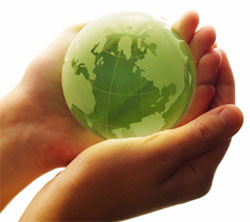|
High-Level Segment (HLS) of Council
2008
Geneva, 12-13 November 2008
|
|
|
|
HLS-08 Home |
|
Programme |
|
Climate Change |
|
Cybersecurity |
|
Statements |
|
Videos |
|
|
|
|
HLS 2008 Sessions on Climate Change |
|

|
-
Information and communication technologies (ICTs) can play a critical
role in combating climate change through mitigation of its effects and
the reduction of greenhouse gas (GHG) emissions.
-
The growing use of ICTs
contributes to global warming, for example, the many billions of mobile
phones, often left to charge overnight.
-
ICTs are also a key part of the
solution, in monitoring, mitigating and adapting to climate change.
-
The work of the
UN Intergovernmental Panel
on Climate Change (IPCC) shows that global greenhouse gas emissions have
risen by 70 per cent since 1970.
-
Background
information on
Climate Change and ICTs...
|
|
|
|
Session 1, 12 November, 11:15-12:30
Combating Climate Change through ICTs |
This session will provide an overview of the role of ICTs in the
wider context of the efforts by developed countries to implement the
Kyoto Protocol and by all countries to commit to more ambitious
reductions as part of the Bali Action Plan and negotiations under
the UNFCCC.Climate change is a concern for all humanity and requires efforts on
the part of everyone, including the information and communication
technologies (ICTs) sector. Although ICTs contribute an estimated
2.5 per cent of total greenhouse gases, this share will grow as
usage of ICTs expands at a faster rate than the general economy.
Although ICTs are part of the cause of global warming, they can also
be part of the solution, for instance through the promotion of
carbon displacement technologies. For example, to avoid travel, by
using telecommunications to work at home and to participate in
conferences.
ICTs also play a vital role in monitoring changes in the climate,
helping to identify new weather patterns and the extent of global
warming.
|
Session 4, 13 November, 09:30-10:45
Adapting to Climate Change: The Role of Emergency Telecommunications |
This session will look at how ICTs can help in adapting to the new
environmental challenges.
Global climate change, including the rising sea level, combined with
rapid global population growth and urbanization have contributed to
an increase in the severity and the number of natural and man-made
disasters.
ICTs such as wireless and satellite communication systems, remote
sensing systems and satellite imaging can make a vital difference,
allowing warnings to be sent of impending disasters. In the first
crucial hours and days after a disaster they allow the
identification of its extent, the location of survivors, and permit
humanitarian teams to communicate effectively, including with local
hospitals and paramedics.
|
|
|



